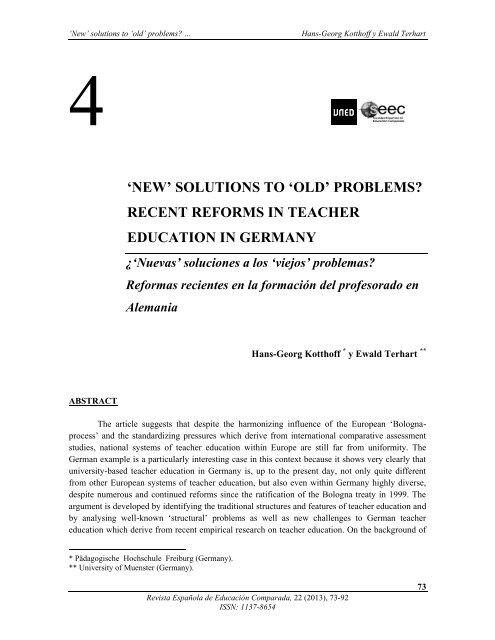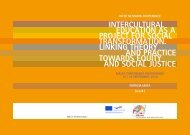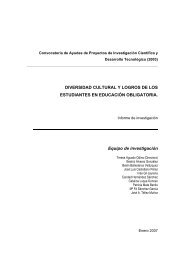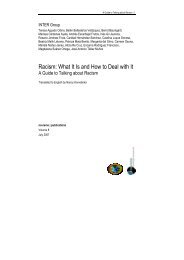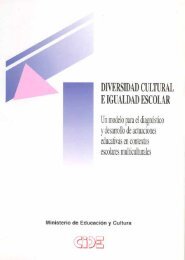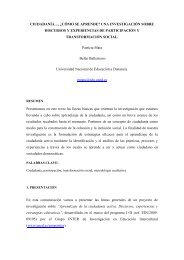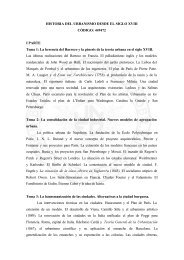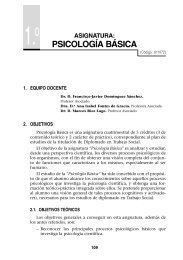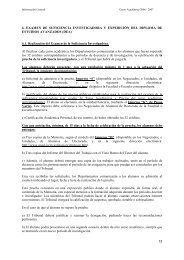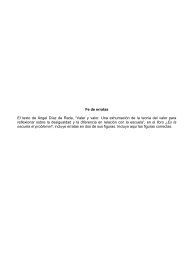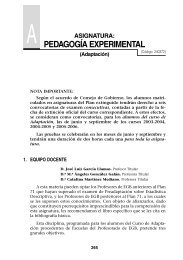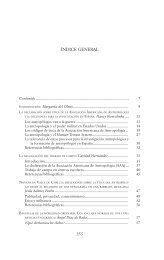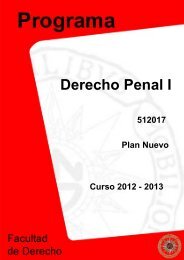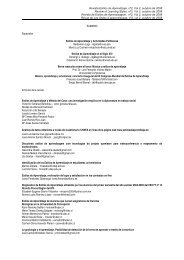'NEW' SOLUTIONS TO 'OLD' PROBLEMS? RECENT ... - UNED
'NEW' SOLUTIONS TO 'OLD' PROBLEMS? RECENT ... - UNED
'NEW' SOLUTIONS TO 'OLD' PROBLEMS? RECENT ... - UNED
Create successful ePaper yourself
Turn your PDF publications into a flip-book with our unique Google optimized e-Paper software.
‘New’ solutions to ‘old’ problems? …<br />
Hans-Georg Kotthoff y Ewald Terhart<br />
4<br />
‘NEW’ <strong>SOLUTIONS</strong> <strong>TO</strong> ‘OLD’ <strong>PROBLEMS</strong>?<br />
<strong>RECENT</strong> REFORMS IN TEACHER<br />
EDUCATION IN GERMANY<br />
¿‘Nuevas’ soluciones a los ‘viejos’ problemas?<br />
Reformas recientes en la formación del profesorado en<br />
Alemania<br />
Hans-Georg Kotthoff * y Ewald Terhart **<br />
ABSTRACT<br />
The article suggests that despite the harmonizing influence of the European ‘Bolognaprocess’<br />
and the standardizing pressures which derive from international comparative assessment<br />
studies, national systems of teacher education within Europe are still far from uniformity. The<br />
German example is a particularly interesting case in this context because it shows very clearly that<br />
university-based teacher education in Germany is, up to the present day, not only quite different<br />
from other European systems of teacher education, but also even within Germany highly diverse,<br />
despite numerous and continued reforms since the ratification of the Bologna treaty in 1999. The<br />
argument is developed by identifying the traditional structures and features of teacher education and<br />
by analysing well-known ‘structural’ problems as well as new challenges to German teacher<br />
education which derive from recent empirical research on teacher education. On the background of<br />
* Pädagogische Hochschule Freiburg (Germany).<br />
** University of Muenster (Germany).<br />
Revista Española de Educación Comparada, 22 (2013), 73-92<br />
ISSN: 1137-8654<br />
73
MONOGRÁFICO<br />
La Formación del Profesorado en el Siglo XXI<br />
these analyses the authors present recent reforms of teacher education in Germany, which they<br />
place between three major reform initiatives: the ‘Bologna-process’, the professionalization and the<br />
standardization of teacher education in Germany. The article concludes by discussing recent<br />
reforms of German teacher education from an international and comparative perspective.<br />
KEY WORDS: Teacher education; Reform; Germany; Historical development; New<br />
challenges.<br />
RESUMEN<br />
El artículo sugiere que a pesar de la influencia armonizadora del “proceso de Bolonia” y de<br />
las presiones de estandarización que se derivan de los estudios de evaluación internacional<br />
comparados, los sistemas nacionales de formación del profesorado en Europa están lejos de la<br />
uniformización. En este contexto, el ejemplo alemán es especialmente interesante pues muestra<br />
claramente que la formación docente a nivel universitario en Alemania es, hasta la actualidad, no<br />
solamente bastante distinta del resto de sistemas europeos de formación de profesorado, sino que<br />
incluso dentro de Alemania existe una gran variedad de modelos, y ello a pesar de las continuas y<br />
numerosas reformas que se han emprendido en el país tras la aprobación de Bolonia en 1999. La<br />
argumentación se desarrolla identificando las estructuras y características tradicionales de la<br />
formación del profesorado, así como sus conocidos problemas “estructurales” y los nuevos desafíos<br />
de la formación del profesorado en Alemania, derivados de recientes trabajos de investigación<br />
desarrollados sobre esta temática. Como marco interpretativo de estos análisis, los autores presentan<br />
las últimas reformas de la formación del profesorado aprobadas en Alemania, y que sitúan en torno<br />
a tres grandes iniciativas de reforma: el “proceso de Bolonia”, la profesionalización, y la<br />
estandarización de la de la formación del profesorado en Alemania. El artículo concluye discutiendo<br />
reformas recientes de la formación del profesora en Alemania desde una perspectiva internacional y<br />
comparada.<br />
PALABRAS CLAVE: Formación del profesorado; Reforma; Alemania; Desarrollo<br />
histórico; Nuevos desafíos.<br />
INTRODUCTION<br />
*****<br />
The reform of teacher education in Germany has been high on the educational agenda at<br />
least since the mid-1990s, when various expert groups and commissions, ministries of education<br />
and teacher organizations started to produce numerous analyses, reports and recommendations as to<br />
how to ‘solve’ apparent deficiencies and problems and thus to improve teacher education (e.g.<br />
TERHART, 2000) 1 . In addition to these internal pressures to reform teacher education, there have<br />
been, particularly since the beginning of this century, additional international reform pressures,<br />
which have accelerated the pace of reform in Germany and elsewhere. However, neither the results<br />
1 An extensive overview of the early reform initiatives is provided by Szyzyrba/Wildt (2001), while Keuffer<br />
(2010) focuses on the developments since 2000.<br />
74<br />
Revista Española de Educación Comparada, 22 (2013), 73-92<br />
ISSN: 1137-8654
‘New’ solutions to ‘old’ problems? …<br />
Hans-Georg Kotthoff y Ewald Terhart<br />
from international comparative assessment studies like TIMSS, PISA and PIRLS, which in<br />
Germany were used from 2000 onwards to initiate changes in schooling and education and also in<br />
the field of teacher education, nor the European ‘Bologna process’, which has also affected<br />
university-based teacher education (KOTTHOFF and DENK, 2007), has led to a uniform system of<br />
teacher education in Germany. On the contrary, as is well-known from the extensive comparative<br />
education literature on educational policy borrowing (PHILLIPS and OCHS, 2004; STEINER-<br />
KHAMSI and WALDOW, 2012), so-called ‘international’ or even ‘global’ educational trends do<br />
not lead to uniform results in any given education system, but ‘shift shape’ (COWEN, 2012) as they<br />
cross national borders. In this article, we will argue that ‘shape shifting’ in teacher education did not<br />
only happen when the Bologna process embraced teacher education in Germany, but also within<br />
Germany whilst international and national trends in teacher education have been crossing the<br />
borders of the 16 federal Länder (states) and initiated different reforms. However, before we<br />
analyse recent reforms in teacher education in Germany in more detail (5) and discuss them from a<br />
comparative and international perspective (6), we need to place these reforms in their historical<br />
context, i.e. the traditional system of teacher education in Germany (2), and to analyse the wellknown<br />
structural problems (3) as well as the ‘new’ empirical evidence on teacher education in<br />
Germany (4), which have challenged traditional teacher education models and concepts and<br />
initiated the recent reforms.<br />
1. TEACHER EDUCATION IN GERMANY: TRADITIONAL STRUCTURES AND<br />
FEATURES 2<br />
The structure of teacher education in Germany is closely linked to the organization and<br />
structure of the school systems in the different Länder. Thus, the following description of the<br />
traditional ‘German teacher education system’ provides an overview of its general features, rather<br />
than a detailed description 3 . Following the primary school, which is a comprehensive school for all<br />
pupils, the lower secondary school is vertically tracked. This school system, which can be described<br />
as a ‘mixed model’ of a horizontally and vertically structured system is also reflected in the teacher<br />
education system. Thus, we can identify vertically differentiated teacher education tracks at the<br />
secondary school level (e.g. grammar schools and teachers for Haupt- and Realschulen) and a<br />
horizontally structured, comprehensive teacher education phase for the primary school level. As a<br />
result of this mixture of horizontal and vertical structures, there is a multitude of teaching degrees in<br />
the different Länder, ranging from teaching degrees for a particular type of school (e.g in Bavaria)<br />
or a teaching degree for a combination of different types of schools (e,g. teaching degree for Hauptand<br />
Realschule in Baden-Württemberg) to teaching degrees for a certain school level (e.g. primary<br />
or lower secondary school). Despite the multitude of different teaching degrees, the relevant entry<br />
requirement for all university-based teacher education courses is the Abitur. As the multi-faceted<br />
structure suggests, teacher education in Germany is not a federal issue and is therefore organized<br />
and controlled by the 16 Länder. In order to guarantee a minimum of uniformity and comparability<br />
of teaching education courses and degrees across the whole of Germany, the ‘Standing Conference<br />
2 For a more detailed description and analysis of the current school structure and the teacher education<br />
system(s) in Germany see the articles by Kotthoff (2011) and Terhart (2006), which also serve as a basis for<br />
this article.<br />
3 For a more detailed description of the traditional German teacher education system, see Sander et al. (1999).<br />
75<br />
Revista Española de Educación Comparada, 22 (2013), 73-92<br />
ISSN: 1137-8654
MONOGRÁFICO<br />
La Formación del Profesorado en el Siglo XXI<br />
of Ministers of Education and Cultural Affairs’ (KMK) coordinates structural issues related to<br />
schooling and teacher education. However, this does not include the definition of entry<br />
requirements, which are defined by individual universities with regard to certain subjects and/or<br />
teaching degrees.<br />
Teacher education in Germany is split into two phases. The first phase is carried out within<br />
the university and finishes with the so-called ‘First State Examination’ (ErstesStaatsexamen).<br />
Baden-Württemberg presents an exception in this respect because it is the only Land which<br />
provides separate ‘universities of education’ (PädagogischeHochschulen) for primary and lower<br />
secondary school teacher education. Again, depending on the individual regulations of each Land,<br />
the first university-based phase can last between 6-7 semesters for primary school teachers and 8-9<br />
semesters for grammar school teachers. There is a tendency in Germany to harmonize the standard<br />
period of study between the different teaching degrees and in some Länder (e.g. in North Rhine-<br />
Westfalia) this has ‘already’ been achieved. This can be regarded as an important step towards the<br />
upgrading of the status of the primary school teaching degree because the length of the standard<br />
period of study is decisive for later payment as a teacher. With regard to the curriculum of<br />
university-based teacher education, future teachers study two or three subjects, which are closely<br />
related to a corresponding academic discipline. In addition, future teachers take classes in<br />
educational studies (including school pedagogy, educational psychology, philosophy and/or<br />
sociology of education) and serve regular school-based internships. Depending on the Land and the<br />
teaching degree, these educational courses of study together with the practical teaching placements<br />
can make up to 30% of the overall study time.<br />
While the first phase is clearly geared towards the acquisition of academic subject<br />
knowledge and the corresponding subject didactics (Fachdidaktik), the second phase is more<br />
practical and aims at preparing the young teachers for their professional duties and their work at<br />
school. The second phase, which lasts between 1,5 and 2 years is independent of the universities<br />
and is organized by special ‘teacher training seminars’ and ‘training schools’ supervised by the<br />
Ministry of Education of each Land. In this phase, during which future teachers receive a moderate<br />
salary, the prospective teachers have to demonstrate their abilities in lesson planning, classroom<br />
teaching and other duties (e.g. evaluation, school development) involved in a teacher’s job. The<br />
performance of the teachers and the development of their competencies is regularly and<br />
systematically evaluated and supervised by teachers from the teacher training seminars and the<br />
teachers (sometimes the head teachers) of the training school concerned. The ‘Second State<br />
Examination’ (ZweitesStaatsexamen) is awarded after the successful completion of this second<br />
phase. Both the first and the second examination, are controlled and administered by regulations<br />
which are issued by the Ministry of Education of each Land and not the university.<br />
After having successfully passed the ‘second state examination’, the majority of new<br />
teachers are assigned to a vacant position by the responsible school administration primarily on the<br />
basis of their two examination grades and, to an extent, also on consideration of personal data (e.g<br />
marital status) and/or additional relevant qualifications. Alternatively, and roughly since 2005<br />
(depending on the Land), teachers can also apply for vacant teaching positions and the individual<br />
school chooses, in co-operation with the local or regional school authorities, the best and/or the<br />
Revista Española de Educación Comparada, 22 (2013), 73-92<br />
ISSN: 1137-8654<br />
76
‘New’ solutions to ‘old’ problems? …<br />
Hans-Georg Kotthoff y Ewald Terhart<br />
most appropriate candidate according to its preferences. In general, teachers in Germany are civil<br />
servants and get tenure three years after entering the service. If a newly qualified teacher does not<br />
want promotion, he or she can continue teaching throughout their career until he or she reaches<br />
retirement, without being officially assessed again. So, in most cases, especially in primary schools,<br />
teaching is – as Terhart (2003: 144) put it - a “profession without a career”. The professional life<br />
cycle of a teacher can be regarded as the third phase of teacher education, i.e., in-service teacher<br />
education. However, the continuing professional development of teachers is not very strongly<br />
developed in Germany and a systematic support system for teachers in their first professional years<br />
through the development of a structured induction period does not yet exist (OECD 2004).<br />
In summary, and disregarding the problems related to the in-service training of teachers, the<br />
analysis of the official guidelines, curricula and objectives of teacher education suggests that the<br />
traditional initial teacher education in Germany appears to be a highly elaborate and systematically<br />
structured system: To enter teacher education, candidates must have earned the highest schoolleaving<br />
certificate. During the first phase all teachers are educated in universities in a broad range of<br />
relevant academic disciplines for, in reality, five to six years (including the exams), they then<br />
undergo an additional practical preparation phase of 1,5 to 2 years, are required to pass two state<br />
examinations and, following a short period of teaching practice, they finally obtain tenure. Based on<br />
the analysis of the official teacher education regulations, curricula and objectives and seen from an<br />
international comparative perspective, teacher education in Germany seems to be a very<br />
sophisticated enterprise. After their rather elaborate teacher training, teachers in Germany receive –<br />
in international comparison – relatively high monthly salaries (OECD 2005) and after their active<br />
working life their pensions are - compared to similar professions in Germany – also quite high. In<br />
spite of these rather favorable underlying conditions, the quality of teacher education in Germany<br />
has been an object of discussion for many years. While some of these problems were identified<br />
more than 20 years ago, others have gained attention more recently through the publication of ‘new’<br />
empirical research findings on teacher education. It is to these ‘old’ and ‘new’ problems of teacher<br />
education that we now turn to in the third and fourth part.<br />
2. ‘STRUCTURAL’ <strong>PROBLEMS</strong> OF TEACHER EDUCATION IN GERMANY<br />
Some of the problems of teacher education have been known for many years or even<br />
decades. Terhart (2006, 2008) has characterized these problems as the ‘structural’ problems of<br />
German teacher education and listed and summarized them in the following way 4 :<br />
- Fragmentation of teacher education: teacher education in Germany consists of many<br />
different fields of study (e.g. subject knowledge, educational and didactical studies) and is<br />
carried out at different institutions (e.g. university, schools, teacher training seminars). This<br />
fragmentation with regard to the content taught and the variety of institutions leads to<br />
discontinuities in the learning process and is an obstacle to efficient cumulative learning,<br />
because the different subjects, phases and institutions of teacher education are not closely<br />
aligned to each other. This leads to ruptures and/or repetitions, which can lead to an<br />
4 For a more detailed analysis of these ‚structural problems see Terhart (2006).<br />
Revista Española de Educación Comparada, 22 (2013), 73-92<br />
ISSN: 1137-8654<br />
77
MONOGRÁFICO<br />
La Formación del Profesorado en el Siglo XXI<br />
extended duration of the teacher education and might be responsible for the relatively high<br />
average age of teachers entering the service, which in the late 1990s was almost 32.<br />
- Professionalism and/or academic subject knowledge: the first phase of teacher education,<br />
which is based at universities, is not very closely directed and oriented towards the needs of<br />
the later teaching position. Thus, it is claimed by critics that it does not provide the teachers<br />
with the necessary professional skills. The subject knowledge, especially for grammar<br />
school teachers, is still very much orientated towards the corresponding academic discipline<br />
rather than the school subject and its didactics. Educational and didactic studies which<br />
should be the core disciplines of initial teacher education seem to be rather arbitrary and<br />
dependent on the individual preferences of the tutors and lecturers.<br />
- Exit exams and entry to the profession: the fragmented nature of teacher education in terms<br />
of curricular content and the institutions in charge of delivering it is also consequently<br />
reflected in its fragmented exit exams at the end of the first phase, which can consist of up<br />
to 10 different exams in the different subjects, for each of which students prepare and then<br />
reproduce up to three different themes. Access to the profession is traditionally granted on<br />
the basis of the two final grades in the first and second state exams on the assumption that<br />
these grades have a prognostic significance for later professional success. Some Länder like<br />
North Rhine-Westphalia and Baden-Wuerttemberg allow for direct application to individual<br />
schools and grant individual schools a certain influence when selecting and recruiting<br />
teachers.<br />
- In-service training of teachers: while the system of initial teacher training is very ambitious<br />
and expensive as far as time and money are concerned, the system of in-service teacher<br />
education is only rather poorly developed. When compared with in-service training<br />
arrangements in other countries (e.g. Canada, Finland, England and the Netherlands), it<br />
seems that traditional in-service teacher training provision in Germany is rather random,<br />
focused on specific areas (e.g. teaching methods, use of multimedia) and mainly based on<br />
individual acts of choice by individual teachers. In-service training is compulsory, but<br />
exactly how teachers fulfill this obligation is entirely up to the individual and is not<br />
prescribed in detail either by the school or the relevant school authority.<br />
- Federal responsibility of teacher education: the length and proportion of educational and<br />
didactical studies differ considerably among the 16 Länder. Until recently student teachers<br />
in the Southern Länder of Germany who wanted to teach at a Gymnasium had to devote just<br />
5% of their total workload at the university to this element of his teacher education, while<br />
her/his Northern counterpart devoted around 25% to educational studies. In general, all<br />
Länder accept the teacher certificates which have been awarded in a different German<br />
Land. However, in certain cases, problems arise if teachers want to move from one Land to<br />
another.<br />
Revista Española de Educación Comparada, 22 (2013), 73-92<br />
ISSN: 1137-8654<br />
78
‘New’ solutions to ‘old’ problems? …<br />
Hans-Georg Kotthoff y Ewald Terhart<br />
- Limited flexibility: while transfers between Länder are rather limited due to the Landspecific<br />
features of teacher education, flexibility is further restricted through the fact that<br />
the different teaching degrees are traditionally strongly connected to certain types of<br />
schools (e.g. primary, vocational or grammar schools), which prevent teachers from moving<br />
from one type of school to another. In addition, the responsible school administration is not<br />
able to enforce such a change and to place a teacher in a different type of school because<br />
the awarded teaching degree entitles teachers to a certain salary, which can only be earned<br />
at a certain type of school.<br />
3. ‘NEW’ CHALLENGES <strong>TO</strong> TEACHER EDUCATION AS REFLECTED IN EMPIRICAL<br />
RESEARCH FINDINGS<br />
In addition to these well-known ‘structural’ problems, there are ‘new’ areas of concern<br />
which have entered the educational reform agenda as a result of intensified empirical research on<br />
teacher education in Germany. The general increase of empirical educational research in Germany<br />
during the last 15 years, which was initiated by international and national comparative assessment<br />
studies and the intense (media) reactions to their results (cf. KOTTHOFF and PEREYRA, 2009),<br />
focused from the very beginning on the analysis of teaching-learning processes in schools. In this<br />
context it does not come as a surprise that educational researchers who have tried to analyse and<br />
understand the conditions, processes and effects of teaching and learning, have increasingly focused<br />
their attention on the teacher, who must be regarded as the central figure when it comes to the<br />
implementation of innovations in teaching and schools. The recently published ‘Handbook of<br />
Research on the Teaching Profession’ 5 (TERHART, BENNEWITZ and ROTHLAND, 2011)<br />
presents the latest state-of-the-art of research on teacher education in the German-speaking context<br />
and will be used in this article to provide the reader with a selected overview of research findings in<br />
this field of study 6 .<br />
3.1. Selection, recruitment and professional biographies of teachers<br />
With regard to this first area of research, there is now quite a substantial body of research<br />
evidence on the selection, recruitment and career choice motives of teacher students in the Germanspeaking<br />
context (ROTHLAND, 2011a and 2011b). This evidence suggests that the teaching<br />
profession in Germany is still relatively accessible for members of less educated social classes when<br />
compared with established academic courses of study like medicine or law. The choice of teaching<br />
as a profession is relatively stable within families, indicated by the fact that 24% of the students<br />
studying for a teaching degree originate from families where members are themselves teachers. The<br />
prejudice, or generally held assumption, that students with lower cognitive and intellectual<br />
capacities (as indicates by their Abitur results) enter teacher education is not altogether true, but<br />
applies mainly to those students who are studying to become teachers at the primary school or the<br />
5 The German title is: Handbuch der Forschung zum Lehrerberuf (TERHART, BENNEWITZ and<br />
ROTHLAND, 2011). Throughout this article all translations from German texts are provided by the authors.<br />
6 As the Handbook covers a wide spectrum of research studies ranging from the history of the teaching<br />
profession to teacher stress and burnout, this brief overview will concentrate on three areas of research which<br />
can be said to have had some impact on the current reform agenda of teacher education in Germany.<br />
79<br />
Revista Española de Educación Comparada, 22 (2013), 73-92<br />
ISSN: 1137-8654
MONOGRÁFICO<br />
La Formación del Profesorado en el Siglo XXI<br />
Hauptschule (TERHART, 2011). The motives of the majority of students for choosing the teaching<br />
career remain stable throughout their studies and fit the demands of their later professional lives<br />
quite well: their scientific interests, as well as their achievement orientation, are rather weak in<br />
comparison with other students, while their social orientation is stronger and more developed.<br />
However, there is some evidence that student teachers are, in contrast to their fellow students who<br />
do not choose a teaching career, more likely to show a problematic pattern of dealing with job<br />
challenges and job stress (SCHAARSCHMIDT, 2004).<br />
With regard to the professional biography of teachers, German research studies suggest that<br />
the first years of service are decisive for the further professional development of teachers<br />
(KELLER-SCHNEIDER and HERICKS, 2011). It is a well-established fact in the research on the<br />
professional biography of teachers that newly qualified teachers, as a response to stress and<br />
insecurity, often adapt to the level of professional practice and competence they observe and<br />
experience when looking at their colleagues. The change from rather progressive attitudes acquired<br />
during the initial teacher training to more traditional practices and routines, which primarily aim at<br />
the ‘survival in the classroom’ is an expression of a process of ‘re-socialisation’ which happens<br />
when moving from the university into the teaching profession. However, as Terhart (2011) points<br />
out, more recent studies, which differentiate between different types of newly qualified teachers,<br />
indicate that the way teachers cope with stress and insecurities during their first years of teaching<br />
depends on their personality traits and on how they come to terms with and make use of<br />
professional experience. With regard to the later phases of teachers’ professional development,<br />
empirical evidence is much scarcer. According to Herzog’s overview, the rather general and<br />
universal models of teachers’ professional development, which were developed in the early years of<br />
research on teachers’ professional biographies, have been replaced by much more sophisticated and<br />
differentiated models, which take account of specific biographic phases and/or specific groups of<br />
teachers. The traditional assumption that the teaching career will inevitably reach a ‘bitter end’<br />
because teachers are experiencing increased stress levels, while their general well-being is<br />
decreasing has to be questioned (HERZOG, 2011). This is partly due to increased life expectancy in<br />
general, but also to different work patterns in the teaching career (e.g. lateral entry employees,<br />
sabbaticals, increasing part-time employment).<br />
3.2. Quality and effectiveness of different phases of teacher education<br />
The available empirical research evidence on the quality and effectiveness of different<br />
phases of teacher education is also highly diverse and varied in terms of quantity and quality<br />
depending on the phase under consideration. With regard to the effectiveness of the first universitybased<br />
phase of teacher education, ‘older’ studies (e.g. OSER and OELKERS, 2001) seem to<br />
suggest, that experienced teachers estimate the studies in their subjects (e.g. maths, geography, etc.)<br />
much higher in their academic quality and in their worth for their practical work as teachers than the<br />
courses in education, psychology and sociology etc. When looking back to their university studies,<br />
the teacher education programme is judged as some kind of badly organized ‘patchwork learning’<br />
without structure or centre, and with low academic levels in the educational parts. However, most of<br />
these studies are based on post-hoc judgements and self-estimations of students and teachers. If we<br />
look at more recent studies, which try to measure by objective tests and competence scales what<br />
Revista Española de Educación Comparada, 22 (2013), 73-92<br />
ISSN: 1137-8654<br />
80
‘New’ solutions to ‘old’ problems? …<br />
Hans-Georg Kotthoff y Ewald Terhart<br />
students and teachers have actually learned in general, and what they have learned for their work as<br />
teachers, it is, according to Czerwenka and Nölle (2011), almost impossible to identify consistent<br />
and significant empirical findings. This seems to apply even to those parts of the university-based<br />
first phase, which are highly regarded by past and present students, i.e. practical school-based<br />
teaching internships. Following Hascher’s analysis of the available empirical studies on the<br />
effectiveness of school-based placements during the first phase of teacher education, there is some<br />
evidence which suggests that school-based internships are not necessarily the panacea to improve<br />
teacher education (HASCHER, 2011).<br />
The empirical evidence on the effectiveness of the second phase, i.e. the teacher induction<br />
phase, is also quite heterogeneous. Again, as in the first phase of teacher education, most empirical<br />
studies on the teacher induction phase rely on post-hoc judgements and self-estimations of teachers<br />
and teacher trainers. According to studies by Schubarth et al. (2005), the experiences of the former<br />
students/future teacher in the induction phase are very ambivalent. On the one hand they appreciate<br />
the development of professional and relevant competences in this phase, on the other hand the<br />
preparatory phase is experienced as very strenuous because the newly qualified teachers feel quite<br />
insecure in their new position. In their training schools they have to act as teachers; in the teacher<br />
training seminars they are still learners. However, newly qualified teachers do not only experience<br />
this insecurity during their work in the classroom and in the staff room, but also in relation to their<br />
teacher trainers. This is due to the rather awkward ‘double’ role of the trainers, who are advising the<br />
newly qualified teachers on the work of a teacher, while at the same time evaluating their<br />
professional development and performance. At the end of this phase the future teachers think that<br />
they have gained competences in teaching and in classroom management, while they do not feel<br />
very confident about their acquired competences with regard to school development and/or dealing<br />
with parents (DÖBRICH and ABS, 2007). In his recent analysis of empirical studies on the teacher<br />
induction phase Abs (2011) concludes that there is a lack of convincing effectiveness studies with<br />
an experimental longitudinal research design. One of the reasons for the lack of research on the<br />
second phase of teacher education is, according to Abs that the scientific community and the<br />
political decision-makers cannot even agree on relevant success criteria for this phase, which could<br />
then serve as evaluation criteria.<br />
The available empirical evidence on the quality and effectiveness of the ‘third phase’ of<br />
teacher education, i.e. in-service teacher training, is even less robust than the empirical evidence on<br />
the first two phases. According to the OECD background report on Germany (OECD, 2004) for the<br />
OECD study Teachers Matter (OECD, 2005), Germany belongs to those OECD countries where<br />
the extent of teacher participation in professional development activities is the lowest. In contrast to<br />
Germany, where, according to Lipowsky (2011), in-service teacher training consists of short,<br />
random and hardly connected offers and courses, in-service teacher training in countries like<br />
Canada, the Netherlands, Finland, England and Scotland is organised more systematically and is<br />
acknowledged as an important part of teachers’ professional activity and development. In the<br />
international comparative study on ‘Features of Successful School Systems’ (DÖBRICH and<br />
SROKA 2004) which was initiated after the publication of the first PISA results in 2001, Abs<br />
(2004) concluded with regard to in-service teacher training in the successful PISA countries: “It<br />
appears that teachers are encouraged to participate in in-service training not only when training<br />
Revista Española de Educación Comparada, 22 (2013), 73-92<br />
ISSN: 1137-8654<br />
81
MONOGRÁFICO<br />
La Formación del Profesorado en el Siglo XXI<br />
sessions are made compulsory but also when they receive financial assistance or can procure<br />
promotions as a result of attending specific in-service training sessions” (op. cit., 130). This<br />
presents a stark contrast to Germany where teaching is largely still regarded as a profession in<br />
which the initial training is sufficient for the whole professional career. In his analysis of more<br />
recent studies on teacher in-service training, Lipowsky (2011) identifies factors for successful inservice<br />
teacher trainings such as the length and the perceived relevance of the training, thematic<br />
focusing on the knowledge of students, feedback and coaching (op. cit.: 402-406). However,<br />
whether these concepts of successful in-service trainings can be transferred to a larger numbers of<br />
participants is, according to Lipowsky, questionable.<br />
3.3. Teacher occupational stress and burnout<br />
The third area of empirical research on teacher education that has had a considerable impact<br />
on the current reform agenda in Germany, is the field of teacher occupational stress and burn-out. It<br />
has been repeatedly pointed out in recent years that teachers in Germany retire earlier than members<br />
of other comparable professions (OECD 2005; LEHR 2011), which can be regarded as an indicator<br />
for increased stress levels and job strain in the teaching profession. However, although almost every<br />
publication on this topic underlines the high occupational strain of the teaching profession, the<br />
question of the real strain on teachers has not yet been conclusively answered. Instead, as Klusmann<br />
(2011) points out in her analysis of available research studies on this topic, there is no<br />
epidemiological evidence that the members of the teaching profession carry a higher health risk<br />
than other professional groups. However, whether the real occupational stress levels of teachers are<br />
actually and objectively higher than in other professions is not that important after all. What is<br />
important though, is empirical evidence which suggests that the subjective experience of<br />
occupational stress in the teaching profession has negative implications for the teachers’ health and<br />
their teaching performance (KLUSMANN et al., 2008). With regard to the causes of occupational<br />
stress and strain amongst teachers, empirical research studies (e.g. LEHR, 2011) differentiate<br />
between factors that are related to teachers themselves (e.g. personal traits) and to factors related to<br />
the context of teaching (e.g. deviant pupil behavior, big classes etc.). The same differentiation<br />
between teacher-specific and context-specific orientation can also be observed among the<br />
programmes that have been developed to reduce stress and strain levels. Thus, preventative training<br />
programmes and measures are either directed at the professional environment (e.g. pedagogical<br />
days in schools for health promotion) or at the teachers themselves (e.g. dealing with difficult<br />
student behavior, effective classroom management etc.). According to Klusmann (2011), both<br />
teacher-specific and context-specific measures and trainings seem to be able to reduce stress levels<br />
amongst teachers and should therefore become a regular and integral part of their in-service<br />
training.<br />
4. <strong>RECENT</strong> REFORMS IN TEACHER EDUCATION: BETWEEN BOLOGNA,<br />
STANDARDIZATION AND PROFESSIONALIZATION<br />
As we indicated in the introduction, there is a wide-spread view in Germany that the<br />
Bologna process, which was intended to harmonize European Higher Education, to increase the<br />
transparency of study requirements and to thus support the flexibility and mobility of the students,<br />
Revista Española de Educación Comparada, 22 (2013), 73-92<br />
ISSN: 1137-8654<br />
82
‘New’ solutions to ‘old’ problems? …<br />
Hans-Georg Kotthoff y Ewald Terhart<br />
has failed to reach its aims in Germany, particularly in the field of teacher education (ARNOLD and<br />
REH 2005; TILLMANN 2007). However, while the early observations of an ever-increasing<br />
diversity in German teacher education were mostly based on single case studies or universities,<br />
there is now increasing empirical evidence, which strongly supports this observation<br />
(BELLENBERG 2009; BAUER et al., 2011). In the most recent study by Bauer et al. (2012), which<br />
analyses the heterogeneity of teacher education study programmes in twelve German universities<br />
which prepare students for teaching in the grammar school (academic track), the authors conclude:<br />
“The results corroborate the hypothesis that the study structures of current teacher education<br />
programs are largely heterogeneous. Particularly, we found that programs differ regarding their focus<br />
on academic subjects versus profession-oriented studies and their ranges of required studies in<br />
subject education (6-25 CP) and internships (6-38 CP)” (BAUER et al., 2012: 102).<br />
The impression of increasing diversity in teacher education is strengthened if we look<br />
underneath the highly heterogeneous surface of the university-based study programs at the structure<br />
of the different teacher education models which have been established in the 16 Länder since the<br />
ratification of the Bologna treaty in 1999. According to the same authors the following different<br />
structural variants can currently be found in Germany (BAUER et al., 2012: 105-106):<br />
- The traditional state exam can be found only at very few universities, in particular at<br />
‘universities of education’ (PädagogischeHochschulen). However, those Länder that have<br />
(partly) kept the state exam, have introduced a modularized version of the state exam<br />
course (e.g. Baden-Wuerttemberg, Bavaria, Hesse etc.). The parallel existence of different<br />
models has led to different durations of teacher education courses: e.g. primary school<br />
teachers in North Rhine-Westphalia take a three-year BA course (6 semesters) in addition<br />
to a two-year MA course (4 semesters), while their counterparts in Hesse study only 7<br />
semesters altogether.<br />
- Most Länder have changed to a consecutive model of teacher education consisting of BA<br />
and MA courses or are in the process of changing. In this model the BA represents the first<br />
academic exam, but it does not give access to the teaching profession. Irrespective of the<br />
school type (e.g. primary - grammar school), access is only granted on the basis of a Master<br />
of Education (M.Ed.), partly with an additional second state exam. BA courses come in two<br />
variants: the ‘teacher Bachelor’ prepares for the teaching profession from the very<br />
beginning and is usually followed by the M.Ed. In principle a change to a different MA<br />
program is possible, although it usually requires substantial additional study. The<br />
‘polyvalent Bachelor’ is closely related to one academic subject and gives the students<br />
access to subject related MA courses as well as the M.Ed. Thus, it allows students to<br />
postpone their decision to become a teacher to the end of their BA course and to acquire<br />
their professional teaching competences during their MA course. However, due to the<br />
KMK’s insistence on an early career orientation in all teacher education courses (KMK<br />
2005), many polyvalent BA courses include elements which prepare for the teaching<br />
profession, although in varying degrees. This has led to a large heterogeneity between<br />
polyvalent Bachelor courses with regard to their academic subject and/or professional<br />
orientation.<br />
Revista Española de Educación Comparada, 22 (2013), 73-92<br />
ISSN: 1137-8654<br />
83
MONOGRÁFICO<br />
La Formación del Profesorado en el Siglo XXI<br />
- Bachelor-Master models with a polyvalent orientation are offered in Berlin, Bremen,<br />
Lower Saxony and Schleswig-Holstein, while Brandenburg, Hamburg, Saxony and<br />
Rhineland-Palatinate (plus additional state exam) offer a teacher specific orientation.<br />
Thuringia has a mixed system, in which some universities offer modularized state exams<br />
(e.g. Jena), while others offer the Bachelor-Master model (e.g. ERFURT).<br />
This mixture of diverse models and developments has caused severe criticism in Germany<br />
(e.g. KELLER, 2010; KEUFFER, 2010) and has led to a situation, in which the structural<br />
differences between teacher education models in the 16 German Länder are currently bigger than<br />
before the start of the Bologna process in 1999. However, if we leave the structural differences<br />
aside, there are also a number of common developments in Germany, which suggest a<br />
harmonization of teacher education with regard to its content and objectives. Two of those<br />
developments have recently gained increased attention because they have passed the planning phase<br />
and have actually had an impact on the design of teacher education courses at all levels or phases<br />
respectively.<br />
The first development can be summarized under the umbrella term ‘standardization’ and<br />
concerns primarily the development of competences and standards for teacher education. Given the<br />
extent of the structural differences between the 16 Länder, the development and implementation of<br />
standards for teacher education, which had already been suggested by the ‘Mixed Commission for<br />
Teacher Education’ in 2000 (TERHART, 2000) and were passed by the KMK in 2004 (KMK<br />
2004), is one of the most remarkable reforms of teacher education in Germany. The standards result<br />
from a comprehensive picture of the central duties and necessary competencies of teachers and<br />
describe, in concrete terms, which competences and skills are expected from qualified teachers. The<br />
standards are defined as a hierarchy of competencies at the end of the first university-based study<br />
phase and at the end of the second primarily school-based preparatory and induction phase. By<br />
defining standards, the necessary competencies and abilities are presented in a differentiated and<br />
controllable way and are therefore suitable to not only systematically link the first with the second<br />
phase of teacher education, but also with the in-service training measures during the teachers’<br />
further professional development. A second advantage of standards for teacher education is that in<br />
the course of their development new functions and competences of teachers, which had until<br />
recently been neglected or overlooked (e.g. school development, and self-evaluation etc.), are now<br />
appropriately reflected in the education and training of teachers.<br />
Further attempts to standardize teacher education in Germany can be seen in the<br />
development of so-called core curricula. Core curricula were first developed for the second phase of<br />
teacher education and, depending on the Land in question, first implemented in 2003. In November<br />
2004 the ‘Association for Subject Didactics’ (Fachdidaktik), which is the parent organization for all<br />
German subject didactics, published a core curriculum, which defined obligatory modules,<br />
competences and contents for all subjects, which participate in the university-based teacher<br />
education (Gesellschaft für Fachdidaktik 2004). The ‘German Society of Education’ (Deutsche<br />
Gesellschaft für Erziehungswissenschaft; DGFE) followed four years later and published an<br />
obligatory core curriculum for educational studies within teacher education (DGFE 2008). Apart<br />
Revista Española de Educación Comparada, 22 (2013), 73-92<br />
ISSN: 1137-8654<br />
84
‘New’ solutions to ‘old’ problems? …<br />
Hans-Georg Kotthoff y Ewald Terhart<br />
from these initiatives from those disciplines and subjects which are directly involved in teacher<br />
education, the process of harmonization was also pushed forward by the KMK, which did not only<br />
define the above mentioned obligatory standards, but also set priorities with regards to the contents<br />
of the teacher education in the very same document (KMK 2004). The same applies to the KMK<br />
document on subjects and subject didactics (KMK 2008), which also consists of definitions of<br />
obligatory contents, which apply to teacher education in all 16 Länder. A final initiative which has<br />
to be mentioned in this context is the so-called Quedlinburger Beschluss (KMK 2005), which lays<br />
down obligatory regulations for the mutual recognition of BA and MA courses in teacher education<br />
between the Länder. However, inspite of all these KMK initiatives to harmonize teacher education<br />
in Germany, it is still too early to predict how exactly these initiatives and documents will<br />
eventually shape teacher education in the 16 Länder<br />
The second development can be described as the ‘professionalization’ of teacher education<br />
and aims at orienting teacher education more directly towards the future teaching career and the<br />
acquisition of relevant professional competences. This development presents a challenge to the selfimage<br />
of German universities, which are traditionally focused on the transmission of academic<br />
subject knowledge (‘science’) rather than the direct and practical preparation for a professional<br />
career. If teacher students are supposed to acquire relevant professional competences and skills<br />
already in the first phase of their training, the university-based phase needs to provide learning<br />
opportunities with relevance to the later teaching career. In addition, if the acquisition of<br />
professional competences also includes the use and performance of those practical skills, students<br />
need to be enabled to act in learning scenarios, which allow them to use and to apply their acquired<br />
competences in real-life situations. According to Bosse (2012), a high-quality university-based<br />
teacher education therefore needs to not only accumulate ‘knowledge for storage’, but to involve<br />
students into ‘well-dosed’ action situations, in which they can use their scientific knowledge for the<br />
generation of pedagogical action strategies and the development of professional competences. This<br />
does not mean to preempt the function of the second phase of teacher education, i.e. the systematic<br />
acquisition of practical teaching competences. Rather it is necessary, to precede exemplary and<br />
tentatively and to challenge the students’ competences of perception and reflection on the basis of<br />
theory as well as research (BOSSE, 2012: 21). 7<br />
The provision of action situations as learning opportunities is justified by analysing the<br />
relationship between scientific knowledge (‘theory’) and practical action competence. According to<br />
Bosse (2012), scientific knowledge is not simply ‘applied’ in real life situations, but challenged and<br />
reflectively integrated into one’s actions. Thus, scientific knowledge provides a frame of orientation<br />
and reflection for action in practical situations, in which actors make a reflected and deliberate<br />
choice from a large variety of possible action alternatives (BOSSE, 2012: 22).<br />
If we transfer these principles to the practical design of university-based initial teacher<br />
education courses, student teachers should be involved in simulated or real action situations which<br />
challenge their knowledge and routines. This can be achieved through the use of case studies and<br />
various forms of problem- and/or inquiry-based learning. Although the concept of inquiry-based<br />
learning is well established and has a relatively long tradition in German universities (HUBER,<br />
7 German original; translation provided by the authors.<br />
Revista Española de Educación Comparada, 22 (2013), 73-92<br />
ISSN: 1137-8654<br />
85
MONOGRÁFICO<br />
La Formación del Profesorado en el Siglo XXI<br />
2004), it has not yet been used very often as a guiding principles in the construction of initial<br />
teacher education in Germany 8 . According to Keuffer, the expectations that are attached to the<br />
concept of inquiry-based learning in teacher education are very high: Student teachers are supposed<br />
to reflect the ‘theory-practice-problem’ at a very high and sophisticated level and their reflective<br />
and inquiry-based attitude towards teaching and schools is supposed to persist beyond the second<br />
practical phase of teacher education into their later professional career as a teacher (KEUFFER,<br />
2010: 21). In summary then, the ultimate aim of establishing forms of inquiry-based learning in<br />
German teacher education is an increased professionalization of future teachers, which can be<br />
described with two internationally well-known concepts - these are ‘teacher as reflective practioner’<br />
and ‘teacher as researcher’.<br />
5. TEACHER EDUCATION IN GERMANY IN INTERNATIONAL AND COMPARATIVE<br />
PERSPECTIVE<br />
The answer to the question whether the recently implemented teacher education reform will<br />
indeed provide a ‘new’ solution’ to ‘old’ problems as indicated in the title of this article must<br />
remain open at this point in time. It is certainly true, that many of the identified structural problems<br />
of teacher education in Germany such as its fragmentation seem to be addressed by recent reforms<br />
towards the standardization and professionalization of teacher education. However, as we have<br />
shown, the ways in which these reforms have been put into practice do not only vary between the<br />
16 federal Länder, but also between individual universities within one Land. The uneasy<br />
relationship between federal ambitions to harmonize teacher education (e.g. the KMK) on the one<br />
hand and the unalienable right of the 16 Länder to find their own ‘solutions’ to the problems of<br />
‘their’ teacher education system on the other will be with us for some time to come. In fact, the<br />
recent amendments to the German constitution in September 2006, which underlined the substantial<br />
competences of the Länder in the field of education in relation to the federal level, will probably<br />
mean that, at least with regard to the second phase of teacher education, nationwide obligatory<br />
regulations are rather unlikely in the years to come. Thus, teacher education in Germany is not only<br />
torn between the sometimes rather exaggerated and even contradictory demands of the different<br />
professional and non-professional actors involved (e.g. teachers, universities, ministries of<br />
education, teacher unions, parents, students etc.), but also between the various interests on local<br />
(e.g. institutional), regional (e.g. Länder), national (e.g. KMK) and European (e.g. ‘EUROPEAN<br />
COMMISSION’) levels. Under these circumstances it is perhaps not surprising that teacher<br />
education in Germany seems to be in a state of a ‘rolling reform’, a condition which is perhaps<br />
more easily accepted in other European countries (e.g. Sweden), where the development of reforms<br />
and their implementation seem to be a permanent feature of their education systems.<br />
If we look at the recent developments in German teacher education from an international<br />
and comparative perspective, three points needs to be stressed in particular:<br />
Firstly, with regard to the two main models of teacher education in Europe, which are<br />
usually described as either ‘concurrent’ or ‘consecutive’ (MOON et al. 2003), the first university-<br />
8 The University of Bielefeld, where inquiry-based learning plays an important role in the case study module,<br />
presents an exception in this respect (KEUFFER, 2010: 61).<br />
86<br />
Revista Española de Educación Comparada, 22 (2013), 73-92<br />
ISSN: 1137-8654
‘New’ solutions to ‘old’ problems? …<br />
Hans-Georg Kotthoff y Ewald Terhart<br />
based phase of teacher education in Germany can be characterized as concurrent, because all<br />
elements (i.e. subject knowledge, pedagogical content knowledge, educational studies and some<br />
school practice) are studied from the beginning. However, if we take into account the whole process<br />
of initial teacher education (i.e. the first and second phase), we can also perceive a consecutive<br />
structure: while the first university-based phase is theory- and knowledge-oriented, the second<br />
phase is practice-and skills-oriented (TERHART, 2003). This ‘mixed model’ of a combined<br />
concurrent and a consecutive structure is quite unique in Europe and could in principle, as the<br />
OECD put it in its ‘country note’ on Germany, produce a high quality teacher education:<br />
“This institutional framework provides an exceptional opportunity to link important parts of teacher<br />
education directly to school practice and the development of teacher careers, starting with the<br />
induction period. In particular, the capacity of the second phase to react to the needs of schools is a<br />
major strength of the German system” (OECD, 2004: 28).<br />
However, the two phase teacher education structure and particularly the second phase<br />
established in Germany also present a problem from a European perspective in that they do not fit<br />
very well into the Bologna architecture, according to which the polyvalent Bachelor leads to a first<br />
academic degree which is then followed by a more specified Master programme. One problem is of<br />
course the question of how to integrate the second phase in German teacher education into the<br />
Master degree. More importantly however, there is, as many critics in Germany have pointed out<br />
(e.g. TILLMANN, 2007; TERHART, 2008; KEUFFER, 2010),an inherent and perhaps<br />
unresolvable contradiction between the envisaged Bachelor, which is supposed to be broad and<br />
polyvalent and qualify for professions outside of the teaching career and the wish or rather necessity<br />
to increase professionalization, by orientating teacher education more directly towards the future<br />
teaching career and towards the acquisition of relevant professional competences from the very<br />
beginning.<br />
Secondly, despite recent progresses, the results of empirical research on teacher education in<br />
Germany are, as we pointed out in part 4, still insufficient to give conclusive evidence with regard<br />
to the effectiveness of individual elements and phases of teacher education. The question of how to<br />
construct effective teacher education systems is still even more difficult to research and to answer.<br />
This would require more international comparative studies such as “Mathematics teaching in the<br />
21 st Century”; MT 21 (BLÖMECKE et al. 2008) and the “Teacher Education and Development:<br />
Learning to Teach Mathematics” (TEDS-M) (BLÖMECKE et al., 2010) which, for the first time,<br />
tried to assess and to compare the professional knowledge of future maths teacher by testing them,<br />
rather than relying on theirself-estimations. However, as Blömecke (2011), who is heavily involved<br />
in both of these studies, suggest herself, there are a number of shortcomings of international<br />
comparative research studies so far which have to be addressed in future. To date international<br />
comparative studies on teacher education have mostly focused on teachers of mathematics and<br />
these studies have tested and analysed mainly two key competences, i.e. teaching and diagnosing,<br />
while others (e.g. educating, advising, school development, professional ethos) have been<br />
disregarded. In addition, as Blömecke (2011) points out, in order to assess the long-term effects of<br />
teacher education and to arrive at practical conclusions for the development of teacher education<br />
systems, it will be necessary to conduct proper longitudinal studies, which also include the<br />
professional development of teachers and go beyond the teacher induction phase.<br />
Revista Española de Educación Comparada, 22 (2013), 73-92<br />
ISSN: 1137-8654<br />
87
MONOGRÁFICO<br />
La Formación del Profesorado en el Siglo XXI<br />
Thirdly, while teacher education in Germany is still regarded as an essentially national<br />
profession, different European institutions (e.g. EUROPEAN COMMISSION) have, since the mid-<br />
1990s,started various initiatives to gain influence on national systems of teacher education such as<br />
the development of ‘Common European Principles for Teacher Competences and Qualifications’<br />
(EUROPEAN COMMISSION, 2005), which were published in 2005. So far however, the effects of<br />
European attempts to harmonize structures and contents of teacher education in Europe must be<br />
regarded as rather moderate, particularly when compared with other fields of study within the<br />
European Higher Education Area. This is probably due to the particular national identity raising<br />
function of the teaching profession, which is historically and internationally regarded as one of its<br />
main characteristic features (KOTTHOFF & DENK 2007). In addition, given the limited empirical<br />
evidence with regard to the effectiveness of different systems or models of teacher education, it<br />
seems sensible to approach any imposed ‘European model’ of teacher education with caution. The<br />
same applies of course to federal ambitions within Germany to establish a dominant teacher<br />
education model in the 16 Länder. In the absence of sufficient empirical evidence with regard to<br />
effectiveness of different initial teacher education models, it seems more promising and less ‘risky’<br />
to invest in an elaborate system of in-service teacher education rather than in initial teacher<br />
education, which has been under suspicion of being a “low impact enterprise” (LORTIE, 1975) ever<br />
since the 1970s. A systematic and high quality in-service teacher education system can arguably<br />
produce a higher quality of schools and teaching than the most elaborate system of initial teaching<br />
training, because in-service teacher education systems can react much quicker and more flexibly to<br />
the ever-changing demands on the teaching profession. Unfortunately, it is exactly with regard to<br />
the quality of the in-service training, that the German system of teacher education is, according to<br />
the international OECD (2004 and 2005) study on teacher education, not exemplary, but rather<br />
lagging behind, when compared with international developments in this field (e.g. Finland). To<br />
catch up, universities and universities of education in Germany could, and should, play an important<br />
role in this field and it is to be expected that sooner or later the ‘rolling reform’ will embrace this<br />
part of the teacher education system in Germany as well.<br />
REFERENCES<br />
ABS, H.J. (2004): Professional development of teachers. In: P. DÖBRICH, & W. SROKA (Eds.)<br />
(2004): Features of Successful School Systems: A Comparison of Schooling in Six<br />
Countries. (Münster, Waxmann), pp.119-131.<br />
ABS, H.J. (2011): Programme zur Berufseinführung von Lehrpersonen. In: E. TERHART, H.<br />
BENNEWITZ & M. ROTHLAND (Hg.) (2011): Handbuch der Forschung zum<br />
Lehrerberuf. (Münster, Waxmann), pp. 381-397.<br />
ARNOLD, E.& REH, S. (2005): Bachelor- und Master-Studiengänge für die Lehrerbildung. Neue<br />
Studienstrukturen als Professionalisierungschance? In: Die Hochschule. Heft 1, pp. 143-<br />
156.<br />
BAUER, J. et al. (2011): Spannungsfeld Polyvalenz in der Lehrerbildung: Wie polyvalent sind<br />
Lehr-amtsstudiengänge und was bedeutet dies für die Berufswahlsicherheit der<br />
Studierenden? In: Zeitschrift für Erziehungswissenschaft, 14, pp. 629-649.<br />
Revista Española de Educación Comparada, 22 (2013), 73-92<br />
ISSN: 1137-8654<br />
88
‘New’ solutions to ‘old’ problems? …<br />
Hans-Georg Kotthoff y Ewald Terhart<br />
BAUER, J.,DIERCKS, U., RÖSLER, L., MÖLLER, J. & PRENZEL, M. (2012): Lehramtsstudium<br />
in Deutschland: Wie groß ist die strukturelle Vielfalt? In, Unterrichtswissenschaft, 40, H.<br />
2, pp. 101-120.<br />
BELLENBER, G. (2009): Bachelor- und Masterstudiengänge in der LehrerInnenbildung im Jahr<br />
2008. In: A. Keller & U. Rödde (Hg.): Endstation Bologna? Die Reformdebatte zur<br />
LehrerInnenbildung in den Ländern, im Bund und in Europa. (Frankfurt/Main, GEW), pp.<br />
15-29.<br />
BLÖMEKE, S. et al. (Hg.) (2008): Professionelle Kompetenz angehender Lehrerinnen und Lehrer.<br />
Wissen, Überzeugungen und Lerngelegenheiten deutscher Mathematik-studierender und –<br />
referendare – Erste Ergebnisse zur Wirksamkeit der Lehreraus-bildung. (Münster,<br />
Waxmann).<br />
BLÖMEKE, S. et al. (2010): TEDS-M 2008 – Professionelle Kompetenz und Lerngelegenheiten<br />
angehender Primarstufenlehrkräfte im internationalen Vergleich. (Münster, Waxmann).<br />
BLÖMECKE, S. (2011): Forschung zur Lehrerbildung im internationalen Vergleich. In, Handbuch<br />
der Forschung zum Lehrerberuf, pp. 345-361.<br />
BOSSE, D. (2012): Zur Situation der Lehrerbildung in Deutschland. In: D. Bosse, Criblez, L. & T.<br />
Hascher (Hg.): Reform der Lehrerbildung in Deutschland, Österreich und der Schweiz (Teil<br />
1: Analysen, Perspektiven und Forschung). Immenhausen: Prolog-Verlag, pp. 11-28.<br />
COWEN, R. (2012): The exemplary, the exotic and the exact in comparative and intercultural<br />
education. In: Intercultural Education Vol. 23, ( 5); pp. 397–409.<br />
CZERWENKA, K. & NÖLLE, K. (2011): Forschung zur ersten Phase der Lehrerbildung. In,<br />
Handbuch der Forschung zum Lehrerberuf, pp. 362-380.<br />
DGFE (Deutsche Gesellschaft für Erziehungswissenschaft)(Hg.) (2008): Kerncurriculum<br />
Erziehungs-wissenschaft.<br />
DÖBRICH, P. &ABS, H.J. (2007): Bewertungen in der zweiten Phase der Lehrerbildung: Aktuelle<br />
Ergebnisse der pädagogischen Entwicklungsbilanzen mit Studienseminaren in Hessen. In,<br />
Seminar Lehrerbildung und Schule, 1.<br />
DÖBRICH, P. & SROKA, W. (Eds.) (2004): Features of Successful School Systems: A Comparison<br />
of Schooling in Six Countries. (Münster, Waxmann).<br />
EUROPEAN COMMISSION (2005): Common European Principles for Teacher Competences and<br />
Quali-fications.<br />
GESELLSCHAFT FÜR FACHDIDAKTIK (2004): Kerncurriculum Fachdidaktik:<br />
Orientierungsrahmen für alle Fachdidaktiken.<br />
(http://www.fachdidaktik.org/cms/download.php?cat=40_<br />
Ver%C3%B6ffentlichungen&file=Publikationen_zur_Lehrerbildung-Anlage_3.pdf)<br />
[downloaded : 25.11.2012].<br />
HASCHER, T. (2011): Forschung zur Wirksamkeit der Lehrerbildung. In, Handbuch der<br />
Forschung zum Lehrerberuf, pp. 418-440.<br />
HERZOG, S. (2011): Über den Berufseinstieg hinaus: Berufsbiografien von Lehrerinnen und<br />
Lehrern im Blickfeld der Forschung. In: Handbuch der Forschung zum Lehrerberuf, pp.<br />
314-338.<br />
HUBER, L. (2004): Forschendes Lernen. 10 Thesen zum Verhältnis von Forschung und Lehre aus<br />
der Perspektive des Studiums. In, Die Hochschule, Jg. 13 (2), pp. 29-50.<br />
Revista Española de Educación Comparada, 22 (2013), 73-92<br />
ISSN: 1137-8654<br />
89
MONOGRÁFICO<br />
La Formación del Profesorado en el Siglo XXI<br />
KELLER, A. (2010): Gleichermaßen hochwertig und einheitlich lang: Gewerkschaftliche<br />
Anforderungen an die Reform der Lehrerbildung im Bologna-Prozess. In:<br />
Erziehungswissenschaft, 21, pp. 99-107.<br />
KELLER-SCHNEIDER, M. &HERICKS, U. (2011): Forschungen zum Berufseinstieg. Übergang<br />
von der Ausbildung in den Beruf. In: Handbuch der Forschung zum Lehrerberuf, pp. 296-<br />
313.<br />
KEUFFER, J. (2010): Reform der Lehrerbildung und kein Ende? Eine Standortbestimmung. In:<br />
Erziehungswissenschaft 21, Heft 40, pp. 51-68.<br />
KMK (2004): Standards für die Lehrerbildung: Bildungswissenschaften.<br />
KMK (2005): Eckpunkte für die gegenseitige Anerkennung von Bachelor- und Masterabschlüssen<br />
in Studiengängen, mit denen die Bildungsvoraussetzungen für ein Lehramt vermittelt<br />
werden (Quedlinburger Beschluss).<br />
KMK (2008): Ländergemeinsame inhaltliche Anforderungen für die Fachwissenschaften und<br />
Fachdidaktiken in der Lehrerbildung.<br />
KLUSMANN, U. (2011): Belastung und Beanspruchung im Lehrerberuf: Zwischen beruflicher<br />
Praxis und unterschiedlichen Forschungsansätzen. In, Handbuch der Forschungzum<br />
Lehrerberuf, pp. 814-820.<br />
KLUSMANN, U. et al. (2008): Teachers‘ occupational well-being and the quality of instruction:<br />
The important role of self-regulatory patterns. In, Journal of Educational Psychology, 100,<br />
pp. 702-715.<br />
KOTTHOFF, H.-G. (2011): Between excellence and equity: the case of the German education<br />
system. In: Revista Española de Educación Comparada, 18, pp. 28-60.<br />
KOTTHOFF, H.-G.& DENK, R. (2007): Last Past the Post? Teacher Education and the European<br />
Higher Education Area. In, H.-G. KOTTHOFF, S. MOUTSIOS (Eds.): Education Policies<br />
in Europe: Economy, Citizenship, Diversity. (Münster, Waxmann), pp.115-127.<br />
KOTTHOFF, H-G.& PEREYRA, M.A. (Eds.) (2009): La Experiencia del PISA en Alemania:<br />
Recepción, reformas recientes y reflexiones sobre un sistema educativo en cambio.<br />
Profesorado. Revista de Curriculum y Formación del Profesorado, Vol. 13, 2.<br />
LEHR, D. (2011): Belastung und Beanspruchung im Lehrerberuf in der personenbezogenen<br />
Forschung. In, Handbuch der Forschung zum Lehrerberuf, pp. 757-773.<br />
LIPOWSKY, F. (2011): Theoretische Perspektiven und empirische Befunde zur Wirksamkeit von<br />
Lehrerfort- und –weiterbildung. In, Handbuch der ForschungzumLehrerberuf, pp.398-417.<br />
LORTIE, D.C. (1975): Schoolteacher. A sociological study. (Chicago, University of Chicago).<br />
MOON, B., VLASCEANU, L. & BAROWS, C.L. (Eds.) (2003): Institutional Approaches to<br />
Teacher Education within Higher Education in Europe: Current Models and New<br />
Developments. (Bucharest/Romania: UNESCO).<br />
OECD (2004): Teachers Matter. Attracting, developing and retaining effective teachers. Country<br />
Note:Germany. Paris: OECD.<br />
OECD (2005): Teachers Matter. Attracting, developing and retaining effective teachers. Paris:<br />
OECD.<br />
OSER, F. & OELKERS, J. (Hg.) (2001): Die Wirksamkeit der Lehrerbildungssysteme: Von der<br />
Allrounderausbildung zur Ausbildung professioneller Standards. (Zürich, Rüegger).<br />
PHILIPS, D. & OCHS, K. (Eds.) (2004): Educational Policy Borrowing: historical perspectives.<br />
(London, Symposium Books).<br />
Revista Española de Educación Comparada, 22 (2013), 73-92<br />
ISSN: 1137-8654<br />
90
‘New’ solutions to ‘old’ problems? …<br />
Hans-Georg Kotthoff y Ewald Terhart<br />
ROTHLAND, M. (2011a): Wer entscheidet sich für den Lehrerberuf? In: Handbuch der Forschung<br />
zum Lehrerberuf, pp. 243-267.<br />
ROTHLAND, M. (2011b): Warum entscheiden sich Studierende für den Lehrerberuf? In:<br />
Handbuch der Forschung zum Lehrerberuf, pp. 268-295.<br />
SANDER, T. et al. (Eds.) (1999): Teacher Education in Europe in the late 1999s: Evaluation and<br />
Quality. TNTEE Publications, Volume 2, (2). Umea.<br />
SCHAARSCHMIDT, U. (Hrsg.) (2004): Halbtagsjobber? Psychische Gesundheit im Lehrerberuf –<br />
Analyse eines veränderungsbedürftigen Zustands. (Weinheim: Beltz).<br />
SCHUBARTH, W. et al. (2005): Die zweite Phase der Lehrerausbildung aus Sicht der<br />
Brandenburger Lehramtskandidatinnen und Lehramtskandidaten. (Potsdam, Universität<br />
Potsdam).<br />
STEINER-KHAMSI, G. (Ed.) (2004): The Global Politics of Educational Borrowing and Lending.<br />
(New York, Teachers College Press).<br />
STEINER-KHAMSI, G. &WALDOW, F. (2012) (Eds.): World Yearbook of Education: Policy<br />
Borrowing and Lending in Education. (London, Routledge).<br />
SZYZYRBA, B.&WILDT, J. (2001): Neuere Empfehlungen zur Reform der Lehrerbildung – eine<br />
Synopse. In, M. BAYER et al. (2001): Wie werde ich Lehrer? Handbuch Lehramtsstudium.<br />
(Frankfurt, Societäts-Verlag), pp. 327-349.<br />
TERHART, E. (Hg.) (2000): Perspektiven der Lehrerbildung in Deutschland. Abschlussbericht der<br />
von der Kultusministerkonferenz eingesetzten Kommission. (Weinheim/Basel, Beltz).<br />
TERHART, E. (2003): Teacher Education in Germany: Current State and New Perspectives. In, B.<br />
MOON, L. VLASCEANU & C.L. BAROWS (Eds.): Institutional Approaches to Teacher<br />
Education within Higher Education in Europe: Current Models and New Developments.<br />
(Bucharest/Romania: UNESCO/CEPES), pp. 135-156.<br />
TERHART, E. (2006): Problemas estructurales de la formación del profesorado en Alemania. In:<br />
J.M. Escudero, A. Luis Gómez (Eds.): La Formación del Profesorado y la Mejora de la<br />
Educación. Políticas y prácticas. (Barcelona: Octaedero), pp.77-81.<br />
TERHART, E. (2008): Die Lehrerbildung. In, K. Cortina, J. Baumert, A. Leschinsky, K.U. Mayer<br />
& L. Trommer (Hg.): Das Bildungswesen in der Bundesrepublik Deutschland: Strukturen<br />
und Entwicklungen im Überblick. (Reinbek, Rowohlt), pp. 745-772.<br />
TERHART, E. (2011): Forschung zu Berufsbiographien von Lehrerinnen und Lehrern: Stichworte.<br />
In, Handbuch der Forschung zum Lehrerberuf, pp. 339-342.<br />
TERHART, E., BENNEWITZ, H. & ROTHLAND, M. (Hg.) (2011): Handbuch der Forschung<br />
zum Lehrerberuf. (Münster: Waxmann).<br />
TILLMANN, K.-J. (2007): Erziehungswissenschaft in der BA/MA-Struktur: die Lehrerbildung. In:<br />
Erziehungswissenschaft, Heft 35, 18; pp. 17-24.<br />
Revista Española de Educación Comparada, 22 (2013), 73-92<br />
ISSN: 1137-8654<br />
91
MONOGRÁFICO<br />
La Formación del Profesorado en el Siglo XXI<br />
PROFESIOGRAFÍA<br />
Hans-Georg Kotthoff<br />
Professor of Comparative Education at the University of Education in Freiburg, Germany.<br />
Prior to this, he taught in secondary schools in England and Germany and was a lecturer at the<br />
University of Münster where he also took his Ph.D. His research interests include comparative<br />
analyses of European education systems, European educational policy, educational governance,<br />
school evaluation and teacher education. He has coordinated the ‘Socrates/Erasmus Network on<br />
Comparative Education’ between 2001-2003 and is currently vice-president of the ‘Comparative<br />
Education Society in Europe’ (CESE). Among his latest publications is a joint publication with<br />
Miguel Pereyra on the German PISA experience, which is also available in Spanish: Kotthoff, H.-G.<br />
& Pereyra, M.A. (2009) (eds.): La experiencia del PISA en Alemania: Recepción, reformas<br />
recientes y reflexiones sobre un sistema educativo en cambio, en Profesorado. Revista de<br />
currículum y formación del profesorado, Vol. 13, 2, pp. 1-24. Datos de contacto: Pädagogische<br />
Hochschule Freiburg. E-mail: hg.kotthoff@ph-freiburg.de<br />
Ewald Terhart<br />
Prof. Dr. Ewald Terhart, 1976 Diploma in Educational Science, 1978 PhD. and 1982<br />
Habilitation at University of Osnabrueck, 1976 - 1988 Research Assistant and Assistant Professor at<br />
the University of Osnabrueck, 1988-1993 Professor for School Pedagogy at University of<br />
Lueneburg, 1993-2002 Full Professor for School Pedagogy at University of Bochum; since 2002<br />
Professor for School Pedagogy and General Didactics at the University of Muenster. Research<br />
Interests: teachers, teaching and teacher education, reform and development of schools. Recent<br />
publications: Didaktik. Eine Einführung (Stuttgart: Reclam 2009), Handbuch der Forschung zum<br />
Lehrerberuf (Muenster: Waxmann 2011; edited together with H. Bennewitz and M. Rothland);<br />
Erziehungswissenschaft und Lehrerbildung (Münster: Waxmann 2013). Datos de contacto: School<br />
Pedagogy and General Didactics. University of Muenster. E-mail. ewald.terhart@uni-muenster.de<br />
Fecha de recepción: 23de diciembre de 2012.<br />
Fecha de revisión: 24 de enero de 2013 y 28 de enero de 2013.<br />
Fecha de aceptación: 22 de febrero de 2013.<br />
Revista Española de Educación Comparada, 22 (2013), 73-92<br />
ISSN: 1137-8654<br />
92


